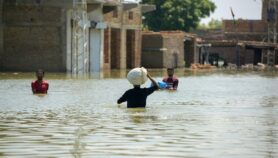Send to a friend
The details you provide on this page will not be used to send unsolicited email, and will not be sold to a 3rd party. See privacy policy.
The world’s top science academies have urged world leaders to engage more closely with the research community to help solve key environmental problems facing humanity, ahead of the G8 summit in the United States later this week (18–19 May).
The so-called ‘G Science’ statements — issued consensually by 15 national science academies — call for an innovative scientific approach to three major issues: solving water and energy needs simultaneously; combating natural and man-made disasters; and accurately assessing greenhouse gas emissions.
The first statement urges governments to pursue an integrated approach to water and energy issues, stressing the interdependence of these resources and their impact on food security.
Efforts should be made to integrate research and policy in both areas, it says, adding that this would require "building local and regional human and institutional capacity for the necessary research, data-gathering, evaluation, planning, governance, technology adaptation, and long-term maintenance".
To achieve this, it says, "global cooperation will be essential, including development assistance to many of the most vulnerable countries".
The second statement calls for strategies to increase resilience to disasters, such as improving health systems and infrastructure, and applying advanced technology to monitor, warn and respond to disasters more efficiently.
It adds that capacity building is needed in vulnerable countries and should be integrated into development assistance programmes.
The final statement outlines the need for accurate, standardised measures of greenhouse gas emissions.
It calls for annual measurement reports and greater international and interdisciplinary cooperation to develop appropriate technology and methods for reducing uncertainties in emission estimates, which it claims are a prerequisite for enforcing any successful international climate treaty.
These issues are deemed to be the most pressing science-based problems not yet tackled by the ‘G Science’ initiative. Since 2005, the initiative has grown from the core G8 nations to include Brazil, China, India, Mexico and South Africa, as well as two invited developing nations, which this year were Indonesia and Morocco.
The consensus approach ensures the statements reflect the scientific community’s joint concerns, although the issues were not purposefully aligned with priorities for other meetings, such as the UN Conference on Sustainable Development (Rio+20) in Brazil next month.
Marie D’Iorio, president of the Royal Society of Canada, told SciDev.Net: "We want to make clear that the biggest challenges are global in nature — and therefore we need multinational solutions which consider the role of science".
But each national academy is responsible for influencing its own government to take action, she added.
The statements could also convince academies in smaller countries to pressure their own leaders to tackle the issues, said Ghislain de Marsily, a member of the French Academy of Sciences.
Link to statement on water and energy ![]() [349kB]
[349kB]
Link to statement on natural disasters ![]()
![]()
![]()
![]()
![]()
![]()
![]()
Link to statement on gas emissions ![]()
![]()
![]()
![]()
![]()
![]()
![]()













